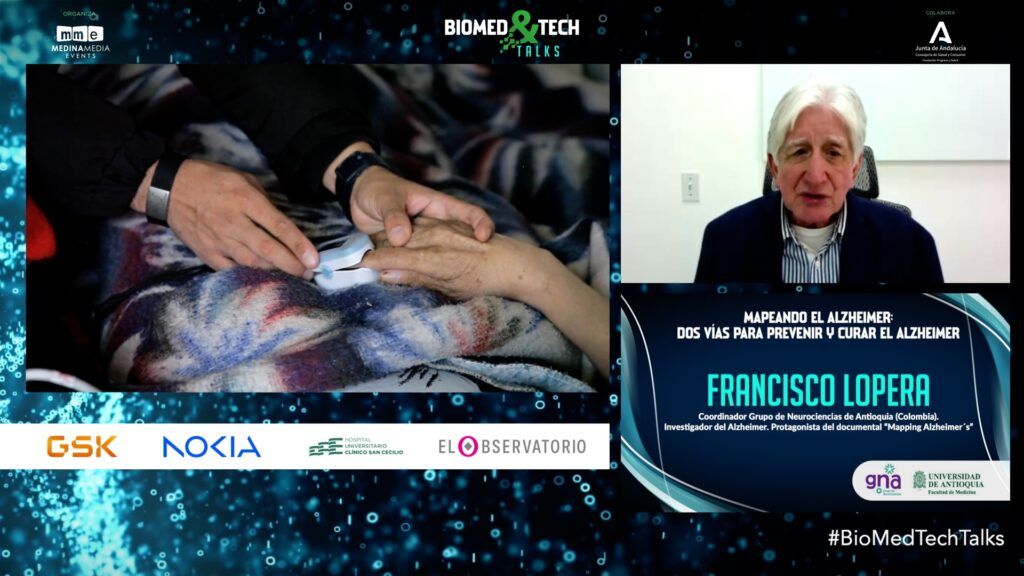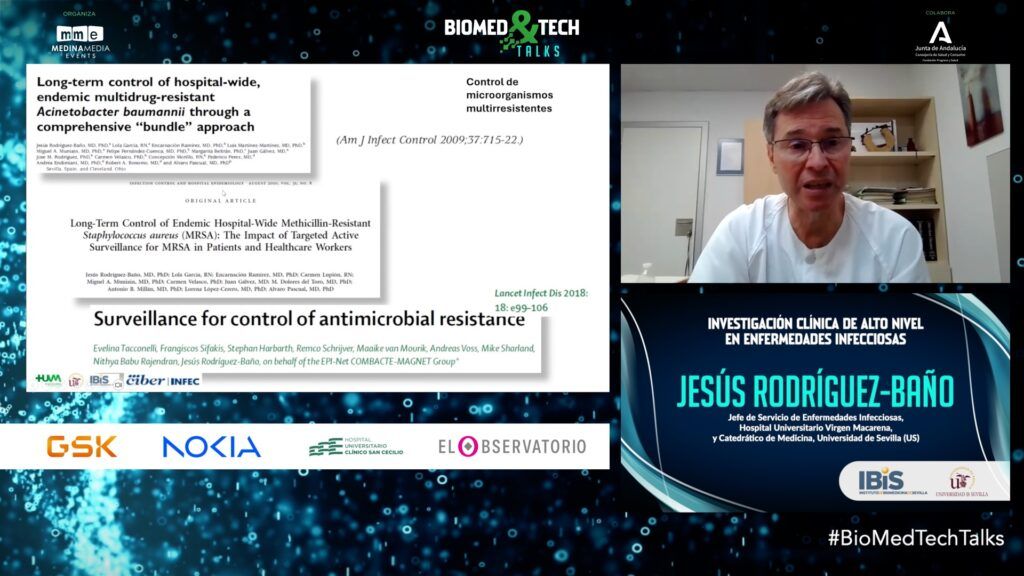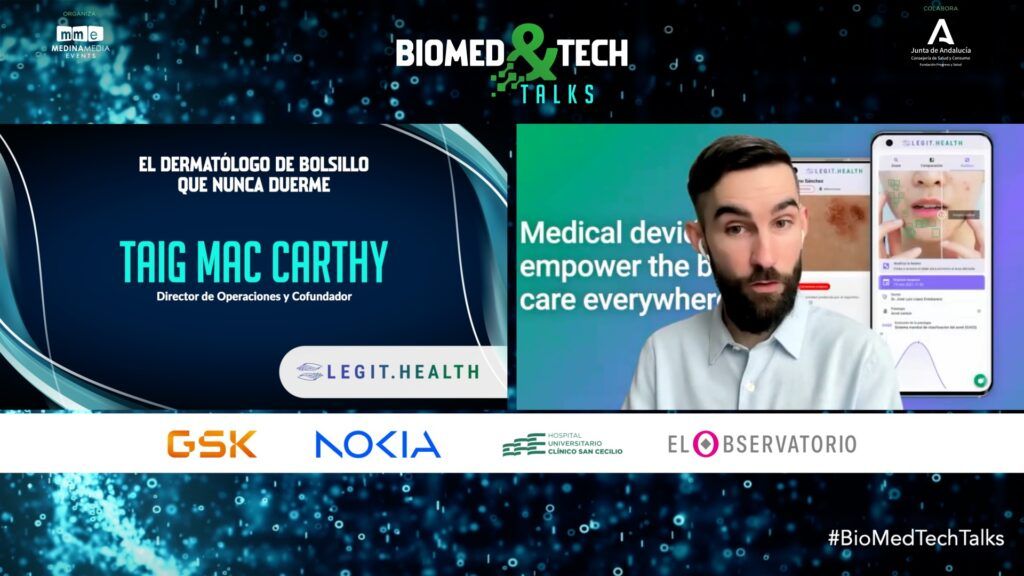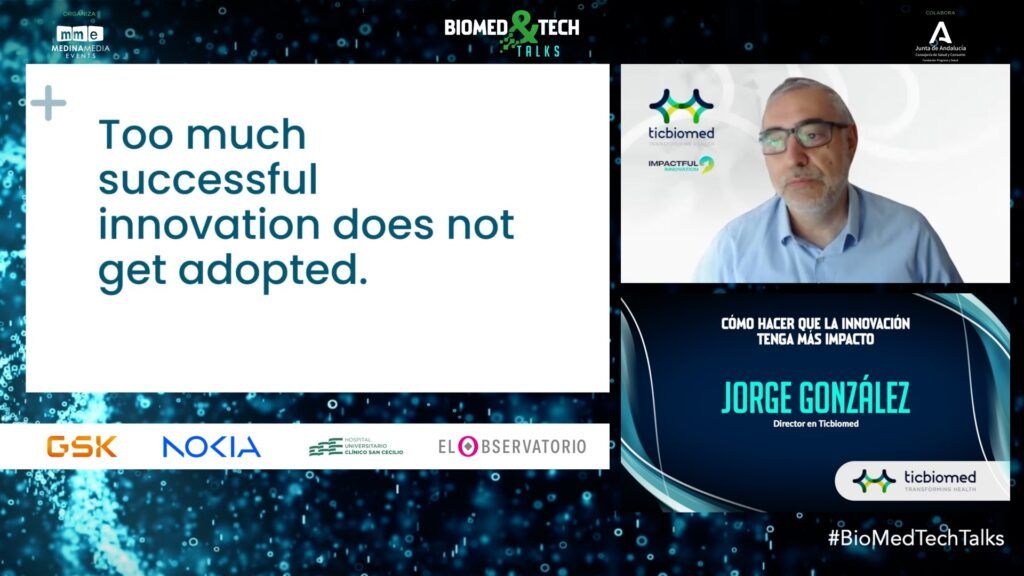-
Dr. Francisco Lopera, a renowned Colombian neurologist, has indicated that “it will be easier to prevent Alzheimer’s than to cure it, because when there are symptoms the brain is already very deteriorated and it is more difficult to revert the damage”.
-
Sonia Contera, Professor of Physics at Oxford University, is working on “a research proposal to try to detect tumors through an encephalogram”.
-
Jesús Rodríguez-Baño, Head of the Infectious Diseases Department at the Virgen Macarena University Hospital and Professor of Medicine at the University of Seville, has warned of the “serious problem” that exists due to the “absence of new effective antibiotics”.
-
Taig Mac Carthy, COO and Co-Founder of Legit.Health, has presented an innovative project 100% ‘made in Spain’ based on Artificial Intelligence that has revolutionized diagnosis and Primary Care.
The first edition of ‘BioMed & Tech Talks’: Your appointment with research and innovation celebrated its fourth and last day yesterday, turning Granada into the epicenter of Biomedicine and Biotechnology during the World Health Week, with more than 40 experts in biomedicine and biotechnology, of which more than 40% were women.
In 10 years there will be a cure for Alzheimer’s disease
The day began with one of the most interesting presentations on the BioMed & Tech Talks agenda, that of Dr. Francisco Lopera, a renowned Colombian neurologist for his research and advances in the understanding of Alzheimer’s disease, a degenerative disease about which he assured that “in five years we will have much more effective and interesting treatments and in 10 years we will have 100% effective treatments to prevent and cure it”.

Regarding sporadic Alzheimer’s, the most common disease, which affects 50 million people worldwide, a figure that will increase to 152 million in 2050, Dr. Lopera stated that “it will be easier to prevent it than to cure it, because when there are symptoms -of Alzheimer’s-, the brain is already very deteriorated and it is more difficult to reverse the damage. On the other hand, preventing Alzheimer’s will be easier because the brain is not so destroyed”. A vision that has already been presented throughout BioMed & Tech Talks, where many experts agreed on the need for prevention before having to deal with the cure of diseases.
Tumor detection by encephalogram
From Colombia, ‘BioMed & Tech Talks’ has taken an air bridge to the United Kingdom, where physicist and nanotechnologist Sonia Contera, Professor of Physics at the University of Oxford and Vice-Dean of the Faculty of Physics at the University of Oxford, has participated. She has described her work in “creating physical methods to understand biology at the nanoscale and facilitate the creation of new medicines” such as the COVID vaccines, the first nanomedicines to be used on a global scale.

Among other ambitious projects, Sonia Contera is working on “a research proposal to try to detect tumors through an encephalogram”, which she combines with others such as finding “sustainable materials that allow architects to create buildings with materials that do not emit as much carbon as steel or concrete”. Regarding Artificial Intelligence, one of the most relevant topics at this conference, the nanotechnologist said that “it opens up the possibility of identifying patterns within complex systems”, although it is true that “it also has many disadvantages” due to the complexity of many processes that AI will not be able to predict.
Alarm over major antibiotic crisis
Back in Spain, Jesús Rodríguez-Baño, Head of the Infectious Diseases Department at the Virgen Macarena University Hospital, and Professor of Medicine at the University of Seville, has addressed the development of high-level clinical research in infectious diseases in which he has been working with his team for some years. Among many other tasks, Rodríguez-Baño and his working group focus on “control measures and the reduction of the incidence of infections in patients admitted to hospital”. “We are concerned about how we can improve the prognosis of some complex infections,” insisted the US professor, who at the same time sounded the alarm in the face of the great antibiotic crisis.

“For 20 or 30 years there have been no antibiotic molecules with revolutionary mechanisms of action”, said Jesús Rodríguez-Baño, who insisted on the “serious problem” that “no new effective antibiotics are appearing”. In view of this situation, one of the works to which he is devoting his efforts is to “rescue some forgotten antibiotics”, whose research was abandoned in the 70s and 80s in the face of the appearance of very effective antibiotics that responded to the needs of that time.
The healthcare industry requires profiles that are hard to find
Ángeles Barrios, Director of Public Affairs and Stakeholder Relations at the European Institute of Innovation & Technology (EIT Health) in Spain, a dynamic organization in charge of generating communities around the triangle of knowledge, innovation and business development, said that “the industry requires a series of profiles that are difficult to find at the moment”, which is why Spain faces three challenges and three transitions: Digital, Ecological and Demographic. And the solution lies in public-private collaboration.

In the opinion of the director of EIT Health Spain, the work of this institute with academic institutions is very necessary, as she considers it vital “to make the healthcare sector attractive to students of technological careers”, profiles that are increasingly in demand in this sector and which are not easy to find. In his view, “young people do not think of the healthcare sector as a place in which to generate business, but rather as something linked only to the medical side”, a perception that it is important to change.
A pocket dermatologist, the innovative project ‘made in Spain’.
Taig Mac Carthy, COO and Co-Founder of Legit.Health, presented one of the most innovative and revolutionary projects 100% ‘made in Spain’ that combines very common pathologies such as skin problems with Artificial Intelligence. All of this with one objective: “To facilitate the work of primary care doctors so that they can attend and refer patients more easily and, in this way, alleviate the saturated healthcare system“.

Legit.Health is a world leader in this technological component which, in the words of Mac Carthy, is basically a “pocket dermatologist”, since “a simple photo with a cell phone becomes the start of the healthcare process”. Using AI, the general practitioner can assess the degree of involvement and, in this way, “diagnose or refer to the specialist more easily and quickly”. A revolutionary and European project that is already present in several European countries and that will soon reach the United States based on Big Data technology about which Taig Mac Carthy has left a devastating statement: “Doctors can never be replaced by Artificial Intelligence. The aim of this technology must be to help the doctor so that he can help patients”, but never to eliminate it from the system, “it would be foolish”.
Innovation does not have the impact it should
Jorge González, Director at Ticbiomed, has been in charge of closing this first edition of ‘BioMed&Tech Talks’ providing a critical and necessary vision on innovation and its impact on society, mainly on patients and healthcare professionals. Jorge Gonzalez regretted that “there is no awareness that there is a serious problem” in this field, since “innovation does not end up having the impact for which it is being developed”.

“We are destroying the culture of innovation and we are not aware of it,” said the director of Ticbiomed, a non-profit association based at the University of Murcia that serves as a bridge between healthcare organizations and companies for the development of innovative projects. “It is a waste of money, an opportunity cost for developing other work and a waste of the enthusiasm of those who participate,” said Jorge Gonzalez, who asserted that “we are facing a failed model”.
Innovative format
BioMed & Tech Talks’ has concluded its first edition, which has been very well received, both in its face-to-face sessions at the Hospital Clínico San Cecilio in Granada and in the two virtual sessions, which could be followed through ‘El Observatorio’, the digital platform of Medina Media Events.
BioMed & Tech Talks’ will return in 2025 with its second edition, to be held from 7 to 10 April, again coinciding with World Health Day and World Health Week. Until then, all the presentations of this first edition can be seen through ‘The Observatory’, the digital platform of Medina Media Events, where all the interventions will also be available 24/365 for consumption on demand, like Netflix, but at no cost.
The first edition of ‘BioMed & Tech Talks’ is organized by Medina Media Events in collaboration with the Fundación Progreso y Salud of the Consejería de Salud y Consumo de la Junta de Andalucía and is supported by GSK, Nokia, El Observatorio and the Hospital Clínico Universitario San Cecilio. Also collaborating are IAVANTE, Andalucía TRADE, ASEBIO, Wellness Forum and Granada Convention Bureau, among others.
